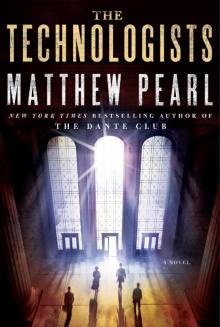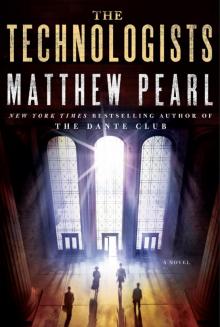- Home
- Matthew Pearl
The Technologists Page 21
The Technologists Read online
Page 21
“In gas form, it would have the same effect,” said Ellen, “on a much broader area against any silicates or glass—not just windows but eyeglasses, drinking glasses, watches. Of course, I suspect the experimenter is using an impure, adulterated compound that we will never reproduce exactly, but replicating its behavior and primary components should allow us to observe what happened with some exactitude.”
“If we have hit upon the right chemical formula,” Bob said.
“Then we are leagues closer to finding where it could have come from,” Marcus said, finishing his thought.
Their mutual excitement was interrupted by a knock at the door to the laboratory.
“Busy!” Bob answered.
The knock repeated itself and the door swung open.
“I said ‘busy’!” Bob bellowed.
“Greetings, fellows.”
“Hammie,” Bob said, utterly surprised. As he spoke, he moved in front of the demonstration table, blocking it from Hammie’s view. “You have a key to this room?”
Marcus tensed.
“Why are you in the building so late, Hammie?” Edwin finally managed a less leading question.
“Come now, enough of this pretense. I know what you’re all doing here,” Hammie said somberly, taking a few leisurely steps inside. His hat was cocked over to one side and his face was unevenly shaved around the bends of his cheeks.
“And,” he continued as they stared at him, “I don’t like it, not at all.”
“Listen, Hammie,” Bob pleaded, but Marcus put out his hand, sensing this wasn’t what it appeared.
“The Technologists!” Hammie cried in outrage. “How dare you!”
“What?” Bob asked.
“My father might think to disregard my pursuits, but I shall not allow my classmates to do the same. I won’t! I saw the papers in the faculty offices. You registered yourselves as members of the Technologists and have been holding meetings. I started the Technologists Society when we were sophs. It’s a plain fact of the bylaws that you can’t have meetings without me!”
The others took the opportunity to breathe again.
“Hammie, I didn’t realize that you started the Technologists,” Bob said. “Why didn’t anyone join back then?”
Hammie gazed at the ceiling, then began looking around the room. “Frankly, I couldn’t find any members—that’s just it. What a bore everyone around here is. I always wanted to have a secret society. Say, what is all this?”
“You mustn’t tell anyone,” Edwin blurted out.
“What, Hoyt?” Hammie asked, distracted by the variety of objects on the demonstration tables.
“You mustn’t tell!” Edwin repeated, while Marcus and Bob both gave him surreptitious warning glances that went unseen.
“Yes, you mustn’t say anything, Mr. Hammond,” Ellen said evenly. “The college has asked us to develop new experiments for next year’s curriculum, but it is confidential, lest any underclassmen gain an unfair advantage in the competition for Top Scholar.”
“But you’re a fresh yourself,” Hammie pointed out.
“Not allowed in classes,” Ellen said.
“Well, that is something,” said Hammie. “What a stroke, to have four members of my society all at one fell swoop and a commissioned task from the faculty. But in all my born days, I would not have imagined a girl among the roster.”
“It’s something novel, Hammie,” Marcus offered. Hammie was unpredictable. If he didn’t accept Ellen, he might decide to take their usurpation of his club to the faculty. “That’s right, isn’t it, Bob?”
When he was not dismissing them, Hammie seemed to crave acceptance among his peers, and there was no one more popular than Bob to offer it up. Bob grimaced at his predicament. “Yes, yes. She’s not nearly as bad as she looks,” he murmured.
Hammie meditated on it, chewing at the side of his mouth. “Say, miss,” he said, turning to Ellen and inspecting her from the front and the side, “when were you born? Exactly?”
She clenched her teeth firmly as though to say that the answer would have to be wrung forcibly from her lips. Marcus pleaded with his eyes for her to oblige. She finally said, faintly, December 3, 1842.
“And time of day, Miss Swallow?” She told him. “You are nine thousand, two hundred and eighty-three days old, not counting today, of course,” Hammie said almost instantaneously. This seemed to calm his reservations and he interlocked his fingers in thought. He paced the line of students like a drill sergeant. “Having one of the weaker sex in a private society is a novel idea. You do wish to have a position, miss?”
Visibly cringing at the choice of gender terminology for her, Ellen, barely audible, assured him in her tamest voice, “I do, very much so, Mr. Hammond.”
Hammie’s eyes lingered on her a moment too long as he continued his examination of the troops. “Well, I suppose I shall have to revise our charter. The Technologists, as perhaps you know, are dedicated to protecting the status and reputation of the Institute. One other thing. The charter states quite directly that each new member must pronounce the oath of the society aloud, or be banished at once and nevermore enter this chamber.”
“Oath?” Marcus asked.
Hammie stood up straight and said in a grave tone: “ ‘I always swear by Tech and always mean to.’ ” He waited.
The others looked at one another and then repeated the words halfheartedly.
“Remember, Hammie, a member of a secret society must never speak of it to nonmembers,” Bob cautioned. “It should be kept entirely among ourselves.”
“My dear Richards,” Hammie replied with his sloppy smile, “I despise most people: ninety-nine percent, to approximate. Of course I know the rules. You are addressing the president of the Technologists Society. Does someone have glasses and some wine, or perhaps cider?”
“There are these, Hammie,” Edwin said, gesturing to some porcelain tubes used for experiments.
“Here you are,” Bob said, removing a small black bottle from inside his coat pocket.
“That shall suffice.” Hammie poured a little whiskey from the bottle into five tubes. They each raised one, following his lead. “Fellows, let us drink to the health of the Technologists, now and forever!” The four men swallowed the drinks down. Ellen poured hers down the sink as the new president of their society was occupied doing a sort of ecstatic war dance around the headquarters.
XXV
Four Pulls
THEY HAD NEVER SEEN ANYTHING like Marcus’s machine suit except in the etchings of fantastic tales written to excite the imaginations of children. Even Marcus took a step away to examine it as they unwrapped the blankets it was bundled in and began assembling the parts.
“It won’t kill anyone, will it?” Bob asked of the invention.
“I can’t help but think I’m here to put together Frankenstein’s monster,” remarked Ellen.
Edwin had turned noticeably pale.
“Don’t mind them, Edwin,” Marcus said to reassure him. “In any case, I’m the one who is going to be inside.”
“Perhaps we should test it further before anyone wears it,” Edwin said.
But they had already agreed it was time. Ellen had already translated all the details in the science journals that described similar equipment a German engineer had constructed several years before. True, the German design had led to two fatalities but they had modified the design over the last few days by using the water tank to test their own improvements. Not that the prospective diver didn’t have his own fears. As was always the case with Marcus, he found it much easier to risk something himself rather than worry about a friend in danger.
“The suit is as ready as it will be,” Marcus said, as he snapped a woolen cap over his head and ears. “Help me on with the breathing cap, will you, fellows?”
The four of them were out by the harbor islands on a sailboat Bob had borrowed, the day so far chilly but clear. Bob and Edwin lifted up the heavy brass helmet and lowered it onto Marcus’s
head. This was attached to air pumps and pipes on a leather and canvas suit that Marcus stepped into, which was also fastened by Ellen to a dive lantern. The “breathing cap,” as they named the helmet, had three window slots in the front and sides, and a long hose at its top that connected on the other end to a steel cylinder, engineered and built by Bob and positioned on deck. On Ellen’s suggestion, they had added a device on the helmet so that Marcus could change position more easily without losing his air. They had also prepared a second suit in case any lacerations or dents were found in the equipment as they prepared for the dive, but it all passed their inspection. Marcus’s sleeves and collar were fastened with India rubber rings for further security.
“There, that’s not too bad, is it?” Bob asked. “Does it feel heavy?”
“He’s wearing two hundred pounds, with leaden clogs on his feet, Mr. Richards!” Ellen said. “It needs to be heavy enough to bring him to the seafloor.”
“One other thing,” Bob said. He held out a dagger, which he pulled out of its sheath. “In case you meet any sea serpents.”
Marcus waved this away and tried to say something, which sounded like little more than a dull echo from inside his helmet. He pointed to the steel cylinder, as if to say: Concentrate on that.
“Four pulls on the air pipe, we bring you up,” Edwin confirmed, also pantomiming the instruction.
Marcus nodded as much as the massive helmet permitted. Through the front eye-glass, he could see that his shadow on deck in the morning sun looked completely misshapen. And magnificent.
Bob steered the sailboat carefully in the open water. He had used Rogers’s notes, a nautical map of the area, and the results from their experiments, as well as the interviews with the old wharf rat and Captain Beal, to estimate the most likely regions from which the interference had originated. Beal had revealed to Marcus that the Light of the East, at the first sign of trouble, had been at Castle Island, which had been the outermost boundary of the magnetic disruption. If Bob’s calculations were correct, the origin was far enough out not to be conspicuous but strategically located near the primary channels for ships preparing to dock. It was early in the morning, and the nearest piers were still under repair, so nobody would be watching, or so at least they believed.
With the boat anchored, Marcus was lowered on a rope ladder into the water. He had to perform a tumbling motion with his body to break the surface because of the weight of his costume. Though he had been breathing through the tubes as soon as the helmet was on, it was a startling change that swept through him when he breathed underwater, encased from head to toe by the sea.
There was a thrill about looking ahead and to each side from his three glass eyes. A terrifying thrill. He bobbed down the undulating ladder deeper under the water.
Breathe deeply. Breathe hard. He remembered giving himself those instructions when he had felt he would not live another hour.
By the time he reached the bottom, it seemed a half hour had passed. With every step he took, the entire seabed seemed to sink a little beneath his boots. The ladder and air pipe followed him like a marionette leading his master. At certain moments, there was a tranquillity about it, the distance and freedom from the world. At other times, the strangeness seemed eerie and volatile.
His vision underwater gradually sharpened. There were many objects—silver spoons, some wine bottles made use of by clever sea life—that Marcus supposed had been deposited in the ocean in the course of the disaster, as well as fragments of wood from the wrecked ships. What he didn’t see were any pieces of iron. In fact, that seemed the only material he wasn’t finding among the assorted detritus of shipboard life and marine commerce. After one pause to return to the boat to monitor the equipment, with extra weights added to the suit so he could drop faster, Marcus returned to the search below, shifting it eastward.
But soon, exhaustion overruled excitement and novelty, particularly since the closest thing to any loose iron he found was a lone crowbar and some pieces of a cannon. Had whoever engineered the disaster found a way to remove the iron afterward? This would be unlikely, considering the depth and the amount of iron the students had calculated would be necessary. Or had Marcus been wrong about the cause from the beginning? He looked at the shadow of the boat following above and considered giving the signal to pull him up.
As he had been doing through the expedition, he picked up the instrument that they had fixed by a watch chain to the diving suit. It was one of their less heavy pocket compasses. For the first time the needle was moving in an unusual pattern. Marcus’s heart skipped. He studied his surroundings and found a steamer trunk stuck in the seafloor. He had seen it a few minutes before and surmised it was another piece of lost cargo. It was locked. This did not signify anything of great import, as a trunk full of dresses might be fitted with the sturdiest lock known to mankind for a mere ferry ride.
Marcus returned to the crowbar; when he picked it up with both hands, the edges bent as readily as a twig. At first he thought himself a victim of an optical illusion occasioned by the glass prism of his helmet and the movements of the water. Or the air he was breathing, despite their intricate adjustments and Ellen’s calculations, must be giving him too much oxygen and, temporarily, increased his strength. Then he blinked, finding the bar straight again, and realized it was far more troubling than a moment of superhuman force. The condensed air was affecting his brain. He knew he could not stay down longer. He took the crowbar and returned to the trunk, which he was able to snap open with the bar.
“This is it!” he said to himself, beginning to attach the buoys tied to his suit for the purpose of raising the cargo.
His breathing had quickened, and this, combined, no doubt, with the excessive levels of oxygen, brought on a sudden flush of dizziness. The corner of the seabed where he stood seemed to darken until it was all blackness. A drumming started in his ears. He realized that because he had stayed in one place too long, he was sinking into the muck. As he tried to pull himself out, the swarming scarlet fauna wrapped around his air tube. He froze. If he jerked his body, or even gave the signal on his lifeline to be hoisted, the tube would be broken, cutting off his air in an instant. He remained as still as possible, his heart racing, his arms resting around the steamer trunk. The fish grew braver around him and brushed his suit, and the fauna grew redder and became massive tentacles. Until he blinked, when the weeds returned to their actual size.
Breathe deeply. Breathe hard.
When he thought of dying, he thought of his friends and of Rogers. He had failed them and could not forgive himself.
Then a shadow fell over him. The fish scattered in an instant. A nervous tremor shot through him. If there were sharks passing through these waters, Marcus would have to swim in his heavy gear, and his air tubes would without a doubt be pulled out by the fauna. The shadow slowly resolved into an imposing figure, and a stream of light broke in from above. It was a reflection of the sun against a helmet on another diver, coming toward Marcus, arm raised, wielding a gold-handled dagger that also caught the light as it flashed toward him. Marcus felt himself on the verge of swooning.
With a few slashes of the dagger, the diver attacked the weeds immobilizing Marcus’s breathing tube and freed him. And now Marcus could see the familiar Bob Richards grin through the helmet of the emergency suit they had built.
After taking a moment to recover himself, Marcus signaled his thanks. Bob was already studying the trunk. They attached a chain that they had run alongside the ladder in the event of a hoped-for discovery.
* * *
“THIS CANNOT BE IT!”
Marcus was relieved to be on dry land again, his equilibrium restored. With some labor, they brought the salvaged trunk of large iron pieces to Ellen’s laboratory through the rear entrance of the building. As they had guessed, the iron had been hammered and dented to promote the highest degree of interference to the navigational equipment, but Edwin kept shaking his head.
“This cannot be it, I
tell you,” he repeated. “It’s impossible.”
“Look,” said Bob. “The trunk wasn’t entirely filled, so that as the motion of the heavy waves that morning was jostling it, and the pieces of iron collided, the natural magnetism would be amplified even more. And with the iron in the trunk, nothing was ever seen. The perfect submarine weapon. Fashionable, as well.”
“Fashionable?” Ellen asked.
“The trunk, I mean,” Bob said, “is a very topnotch build. Something you might find in the finest steamship class.”
“Even placed in a precisely calculated position, there is no possibility this amount of iron could derange the compass readings in a radius encompassing the length of that entire channel,” said Edwin.
“Mr. Hoyt is correct, I’m afraid,” Ellen said, studying the trunk of iron from every angle. “This trunk cannot provide the explanation for the disaster, which means this may be an entirely coincidental discovery.”
“We both searched the seabed thoroughly down there,” Bob insisted. “There was nothing else to find!”
“Then we have found nothing,” Edwin replied.
“Let us not make our conclusions yet,” Marcus said. “It is too early to declare a failure.”
Marcus suggested they push the trunk to the back of Ellen’s laboratory until they had time to examine it more. Their general proceedings had changed somewhat now that the female pupil was a partner. Since her laboratory was generally sacrosanct, protected by the rules and equally by fear of her imagined witchcraft, they could safely hide important objects inside. They had installed a one-half-inch glass speaking tube that ran between the two laboratories so they could communicate without the risk of being seen entering her forbidden sanctuary during public hours, and also warn one another when others were present in the basement. They also had begun the work to extend the alarm mechanism from Ellen’s laboratory to alert them of anyone attempting to enter their laboratory. Ellen, meanwhile, had posted a sheet of paper listing all their names under the heading SLANG, and decreed that any use of slang or religious blasphemy from then on would elicit a check mark by the offending name and a fine of one penny. Bob put himself in immediate debt by sighing, “Goodness!” at the whole idea.

 The Dante Club
The Dante Club Dante Club
Dante Club The Poe Shadow
The Poe Shadow The Dante Chamber
The Dante Chamber Ginnifer
Ginnifer Company Eight
Company Eight The Technologists
The Technologists The Professor's Assassin
The Professor's Assassin The Last Bookaneer
The Last Bookaneer Company Eight (Kindle Single)
Company Eight (Kindle Single) The Technologists: A Novel
The Technologists: A Novel The Last Dickens
The Last Dickens